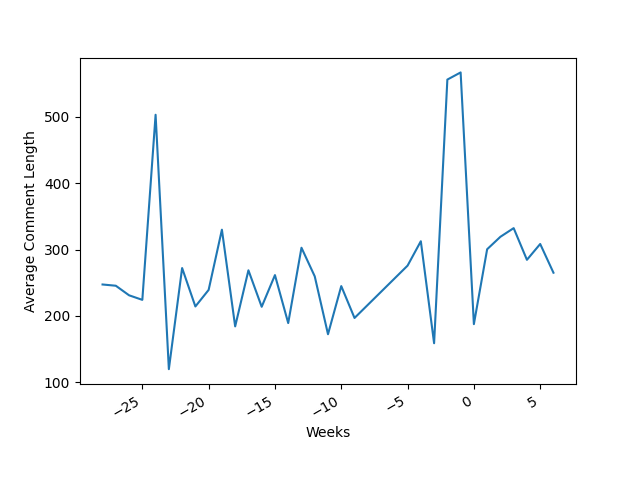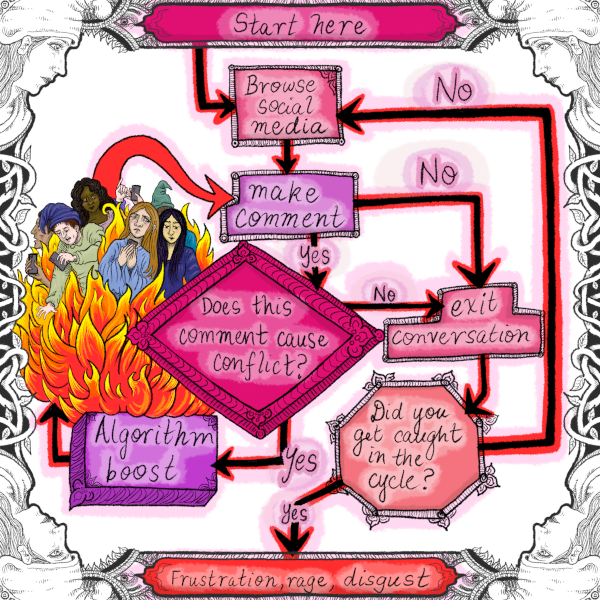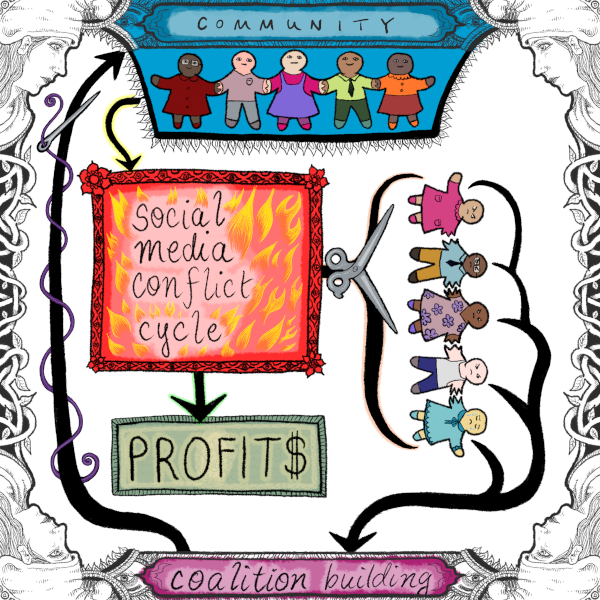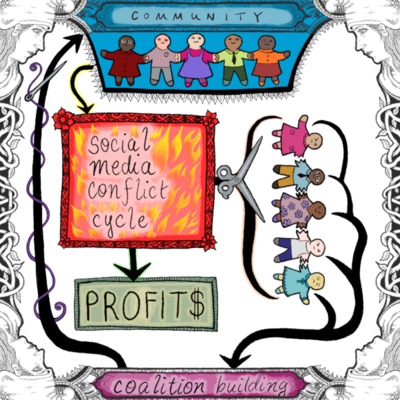In 2013, the late great Mark Fisher wrote an essay titled Exiting the Vampire Castle. When it comes to social media, ten years is a very long time. Back then, Twitter was struggling to make ends meet, but for different reasons than it is today. Facebook was still beloved by the general public. Russell Brand, who is mentioned somewhat prominently in the piece, is now a very different person. Likewise, the piece predates the widespread usage, and probably the coining, of the phrase "cancel culture." And yet, Fisher perfectly predicted and articulated the dynamics of online discussions in the social media era.
Ten years on, I want to do a case study analysis of "cancel culture," an unproductive term I am going to stop using from now on. I will argue that it's not a culture, but a system purposefully engineered to convert our political will into private profit. By providing us with platforms purposefully built to keep us engaged for as long as possible, the attention economy has created an all-consuming void into which we throw our political energy, replacing solidarity with distrust, anger, and disunity. Crucially, I am not arguing that individual actors – the people doing the "canceling" – are doing anything wrong. Nor am I defending or condemning anyone who was canceled. I want to look a systems, and as such, I will studiously avoid any identifying details.
Background
We'll be talking about a media figure who had several thousand patreon subscribers on the day some ugly news broke, or as I call it, "day 0." This is at best a moderately famous person, who I will pseudonymously refer to as Jesse (because that's the most gender-neutral common name I can think of). I don't know, nor do I know how to figure out, how many YouTubers, bloggers, TikTokers, podcast hosts, authors, Twitter handles, artists, musicians, and streamers 1 are as famous as Jesse, but that number is presumably at least in the tens of thousands. My point here is that this is something that can and probably does happen relatively frequently across the web without most of us finding out.
I am going to be using data from the associated but unofficial subreddit. Specifically, I scraped 200 submissions from the subreddit, along with every single comment for each of those submissions. This community primarily uses Facebook and Twitter to interact directly with Jesse. Unfortunately, Jesse doesn't use Reddit, and the subreddit is much, much, much smaller and less active than the Facebook group. Still, I chose Reddit because its API is relatively permissive, and as such, the data was actually available to analyze. Facebook, by contrast, is a black hole.
Finally, it is important to note that Jesse and the community that surrounded them did real world activism. They did real life stuff. This was a functioning political coalition, and its collapse harmed the entire community's shared goals. Please keep this in mind as we go. We'll come back to this at the end.
Case Study
The following graph represents the number of comments per day over time on the subreddit.

In case it isn't obvious, day 0 is the day the news broke. This is on its face a striking graph, but it is actually a bit of an undercount. Here is a graph of the exact same time period broken down by week of the average number of characters per comment.

With the exception of a flurry of longer comments some 25 weeks (175 days) before day 0, which we can see from our previous graph represents a very small number of comments, the average comment length hovers around 250 characters. On day 0, comment lengths jumped to over 500, doubling the average length of a comment.
So on day 0, the subreddit had 2,000 times more comments than an average day, and the comments were roughly twice as long as they had been before. This means the subreddit received, very roughly, about 400,000% the engagement – the tech industry's most treasured resource – than it did before.
What does this mean? Like I said before in the Attention Economy series, the tech industry isn't really in the business of making tech; it's in advertising. Reddit, though small, is no exception, and to understand what this all means, it's worth taking a quick detour through Reddit's finances.
According to businesnsofapps.com2, Reddit's revenue in 2021 was $350 million. This is a huge increase from just 5 years ago, when in 2016 they had just $25 million. The vast majority of this revenue increase has been from advertising, and users of Reddit have noticed the effects this has had on the platform. In 2017, Reddit changed its generic front page from one which aggregated from a predetermined list of popular subreddits to a fully algorithmically generated one pulling from all subreddits across the site, presumably with the goal of increasing engagement.
At the time, this led to very funny results. Longtime internet users such as myself remember that suddenly, very bizarre subreddits were at the top of the new /r/popular (as the subreddit that was also the site's generic new home page is called). /r/PrequelMemes, a delightfully bizarre community for making memes using stills of the Star Wars prequels as templates, suddenly and inexplicably dominated /r/popular (along with a few other equally weird and unexpected subreddits). I suspect that Reddit has continued to experiment with algorithmic changes to increase engagement. Discussions like this about possible algorithm changes when users notice new behaviors are quite common throughout the site. That seems plausible to me.
Since 2017, Reddit's revenue has septupled, mostly from advertising revenue. Reddit has made active efforts to increase that advertising revenue by tweaking their algorithms to engage their users more. We also know that news of Jesse's situation caused a ~400,000% increase in engagement on the subreddit. From Reddit's perspective, the collapse of this community is, financially, the best thing that could've happened. When Reddit tries new features or tweaks its algorithm, that is the signal it is using to measure success. The more drama a feature causes, the more successful it is.
This is a tiny microcosm of the entire internet everywhere, every day, in every community, and on every platform. Reddit's (and Facebook's, and Twitter's, and TikTok's...) financial interest is to increase engagement.3
That means when a community has conflict, the community, using social media, will discuss the conflict in an attempt to resolve it. This uptick in discussion creates a feedback loop, because the platforms we use to communicate are specifically engineered to amplify engagement. In this case, they will pick up that conflict and amplify it. This is not healthy conflict resolution. Communities that wish to remain functional know that, when conflict arises, it is necessary to work it out among friends with mutual respect, not air all the dirty laundry to any and all passers-by.

The frustration, rage, pain, and distrust this creates is real. It spills into the community, and into related, adjacent communities. Users express complicated feelings, and naturally, they try to discuss them with their community. Some examples (lightly edited for anonymity):
Sorry, this comment was me processing my feelings... My husband and I love Jesse and have for years. We talk about them all the time together, speculating on their takes on various issues. Had to share the article with him yesterday and was so sad, Jesse is his favorite media personality.
I really do appreciate you and having this conversation is helping me as I keep processing all that's happened.
I'm still processing the details
I get why it sounds awkward to some people. But my own repressed memories of trauma congealed into a comprehensible thing
I am so heart broken
That was heartbreaking to read.
It's heartbreaking to learn about. Trigger warning, actually.
I'm not making excuses for Jesse here at all. If everything that's being alleged is true, it's heartbreaking, pathetic, and makes me question a lot.
It's important to remember that essentially none of these people actually know Jesse; maybe a few have met them at the occasional live show. They are an incredibly minor celebrity, and this is a parasocial relationship. But, it is equally important to remember that, and I've written about it many times now, Americans are very, super, incredibly, stupendously fucking lonely. It really cannot be overstated. These comments border on melodrama, but it's really important to understand that we live in a society that has dismantled the very concept of community. Reddit is an anonymous platform, and as such, people are expressing how they really feel without fear of shame. A lot of us, myself included, find refuge in online spaces that care about the same things we do. When these groups collapse into conflict and infighting, people feel hurt because it's what they have left. They then try to process those feelings on these platforms with their communities, but because we have allowed internet companies to become the intermediaries through which community discussion can happen, these discussions quickly turn acrimonious.
These people that had once formed a functioning political coalition start accusing each other of all sorts of things. The word "toxic," which appears only a handful of times in the many months prior to day 0, appears 56 times after. Some examples (again slightly edited):
From what I've seen here the last few days the facebook community is toxic as fuck! They have no problem dehumanizing anyone who disagrees.
You guys are toxic, and looking for blood.
Man this sub is almost as toxic as the Facebook group.
From there, the conversation dies down. Unlike healthy conflict, which has meaningful resolution, and from which people grow, this just fizzles, leaving people feeling alienated, angry, and ashamed. Many of these people had contributed time and money to causes together, which is, like, the whole point, but now, they are left feeling stupid for believing that their community could have accomplished anything. They feel shame for putting their trust in someone who let them down. They think back over the years and try to find clues that they should've noticed about how Jesse was actually, secretly, always a bad person (again edited):
You mean like how every time Jesse was wrong about something they said how they were only kinda wrong but mostly right?
I'm with you. Plenty upset at Jesse for this, and their actions after the fact indicate their values in action do not match what they have always espoused. We're justified in being upset by that, because it's easy to feel betrayed an duped. But don't blame yourself. We all fell for it.
They rarely (never?) took full responsibility for getting something wrong without a whole slew of qualifiers. That's what this apology felt like too. A sort of apology with qualifiers.
Now they really feel dumb. They look back and convince themselves that the red flags were always there; they were just blinded by optimism, or enthusiasm, or too naive to see them. Before, they had been excited to be part of something, however small, but now they are wary and mistrustful. They resolve never to be so foolish again.
"The Purpose Of A System Is What It Does"
If, as Stafford Beer4 famously said, "the purpose of a system is what it does," then what is the purpose of social media?
Social media creates private profit from public disunity. It mines political coalitions for engagement, leaving behind fragmented communities too mistrusting and mutually suspicious to form the complex and diverse coalitions needed to challenge the status quo. Social media replaces solidarity with alienation. That is its purpose.

I recognize that this seems like a big claim, but is it really? Anyone who has ever had a political discussion on social media knows in their bones how frustratingly pointless it is. Why then have we convinced ourselves that billions of pointless discussions, when aggregated together, form some sort of functional public square? Isn't it much more plausible that they would instead form a rat's nest of anger, hate, conspiracies, scams, frustration, racism, and misinformation?
Even when you zoom out, the biggest success stories of organizing social movements on social media are dubious at best. Six years ago, #MeToo received wall-to-wall coverage in the US. But what did it accomplish? Harvey Weinstein and some other weirdos and creeps got some comeuppance. That was cool. More women feel comfortable coming forward and telling their story. That's pretty good. It raised awareness. That is also important.
But what is the point of awareness, or the point of sharing stories, without political power to act? Just one year after #MeToo, Brett Kavanaugh, a judge every single one of us knew was part of a decades-long political project to curtail the rights of women, was confirmed to the Supreme Court. A couple years later, Amy Coney Barrett followed suit. Last year, they did exactly as they said they would, and the political response, which we had years to organize, was absolutely pathetic. Where were the mass demonstrations, strikes, and acts of civil disobedience? The era of #MeToo, as many have called it, exists almost exclusively within the confines of polite discourse. It is an illusion that shatters the moment it is confronted with actual political power.
Even the online success of #MeToo seems no better than the offline. I don't think anyone would argue that the internet has become less misogynist in the last six years. Misogyny has come up from hell and taken corporeal form in Andrew Tate, who has become a mainstream internet sensation, especially, and worryingly, among young men and boys. And he isn't alone. The patriarchy is blossoming, turbocharged by the very same social media platforms #MeToo has convinced us we can use to advance gender equality. "Masculinity influencers" peddling supplements and misogyny are so mainstream that CNN is writing about them.
I argue that these are all fundamentally the same phenomenon. Movements organized on social media are attempting to use a system whose purpose is to destroy solidarity for profit. #MeToo might have done some good, but it is also a social movement whose name is essentially Twitter's intellectual property. It was, and continues to be, monetized by Twitter. In our continued attempt to use these platforms counter to their purpose, we inevitably fail, and in our failure, we feed the system we hope to destroy.
1. I still refuse to use the term "content creator." Art is not merely content for internet platforms. The internet is a place to share art.
2. I have no idea if this is a good source, but I did cross check the numbers with reddit's own blog and their own linked sources. The site does seem a little gimmicky, but so does basically every business site. As the joke goes, the stock market is just astrology for boys.
3. In a previous post, I argued that the engagement metric is not economically rational, but an artifact of business culture. I still think this is true, but for now, we must analyze the attention economy on its own terms.
4. I often write about the myopia of the tech industry, which measures progress in clicks, sales, and company valuations. Stafford Beer's work is a wonderful antidote to the small-mindedness of Silicon Valley, and it greatly influenced this post.

